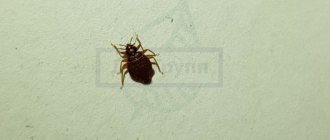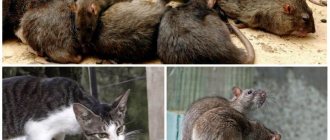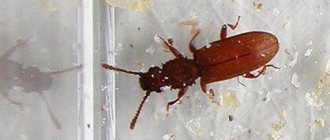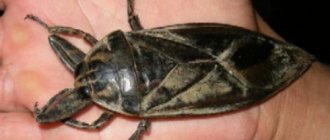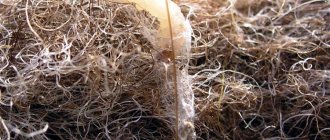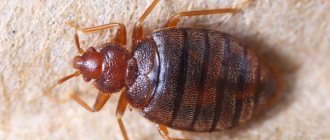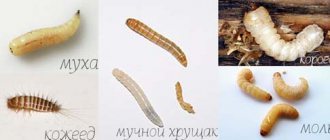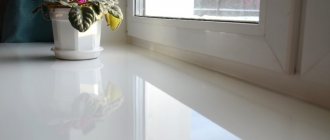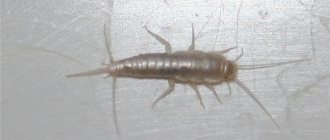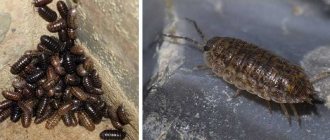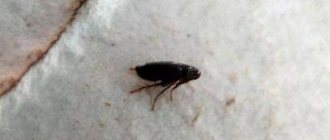Various worms in the apartment are not uncommon; they can be found in the bathroom, in the kitchen, under the carpet and even in your own bed. The reasons for the appearance of worms are always different; even in an exemplarily clean apartment they can be seen in the most unexpected place. For example, you take out cereal to cook porridge, and there are worms swarming in the bag, or you change the bed linen, you lift the sheet, and nasty insects crawl across the bed. In any case, other than a feeling of disgust, and maybe even fear, you will not experience. I want to get rid of the misfortune as quickly as possible, but before doing this, you need to know who you will have to fight with, otherwise there is a risk of losing the war. More often than not, worms are insect larvae; let's take a closer look at who might live next door to you.
Where do they come from?
There can be several options for the appearance of worms of different colors:
- A clothes moth larva (actually a butterfly caterpillar with microscopic limbs). You can usually find them in underwear that has been in the closet for a long time.
- The larvae of the carpet beetle (carpet beetle) are brownish, with protruding fibers.
- The larvae of the beetle grinder (lives in furniture made of wood) are white and quite large. But they can only get into bed by accident and in single quantities.
- Flea larvae are very small and harmless to humans. They are rare.
- Fly larvae (in summer, if there is spoiled food lying around).
Basically, their appearance is random. You can get rid of them by shaking out the contents of the closet, washing them, and using disinfectants (they can be purchased in pharmacies and stores).
If after cleaning the worms appear again, this is a reason to sound the alarm, since you are dealing with pinworms .
What is pinworm
The pinworm is a roundworm that parasitizes the human body and is a type of nematode . Both humans and great apes suffer from these parasites (helminths). The disease they cause is called enterobiasis . Both children (mostly) and adults are susceptible to it.
The body of the worm is round in cross-section, up to 1.5 cm , grayish or white in color, tapering towards the ends. The worms live mainly in the small intestine (in the cecum they can cause appendicitis), and the individuals are dioecious.
Bed mite
It is difficult to see this type of parasite without a microscope; under magnification it resembles a small crab. Bed mites (also known as dust mites) are arachnids.
Characteristics of the insect
The body of an adult representative of this species is no more than 0.5 mm in length, covered with a layer of chitinous shell. It is quite difficult to get rid of the parasite - it clings tightly to the surface with legs with suction cups at the end. Favorite habitats are feather beds and pillows, blankets, mattresses, and carpets. The main food of the laundry parasite is small particles of the epidermis, dandruff, and human sweat.
Danger to humans
The harmful effects on the body are expressed as follows:
- Pinworms contribute to the intoxication of the body with toxic secretions. This causes disturbances in the functioning of the gastrointestinal tract (GIT), expressed in disorders and rapid fatigue of the patient.
- During reproduction, pinworms cause severe skin irritation in the anus and groin area. Itching forces you to scratch these areas until the skin is damaged.
- In its advanced stage, enterobiasis causes severe diseases of internal organs.
These are the most acute forms of harm. There is also a psychological everyday factor, expressed in the attitude of others towards the infected person.
Symptoms of the disease
Infection at an early stage can only be determined by using specialized analysis equipment. To do this, in medical institutions, a smear (scraping) is taken from the patient in the anal area using a cotton swab treated with glycerin or special adhesive tape.
The following symptoms indicate the disease:
- Complaints of severe itching in the anus in the evening and at night.
- Crying and restless sleep in children.
- Frequent intestinal disorders.
- Excessive salivation and stomach pain.
- Fatigue quickly.
Parasites can also be seen visually in feces and on bedding.
Factors of infection
Basically, worm infestation (helminthiasis) occurs when:
- Failure to comply with hygiene rules (dirty hands, unwashed fruits and vegetables, violations of sanitary requirements when storing food).
- There are an abundance of flies that carry parasite eggs.
- Inattentive care of pets.
- Inadequate sanitization of premises where infected people are located.
- Unprotected contact with affected skin areas.
The main threat to everyone is a person infected with parasites. Within 4-7 hours, the eggs laid by pinworms become infectious and dangerous.
If they get on household items, clothing, bedding, or in food, they can cause infection to other people . Due to their microscopic size, they cannot be noticed without the appropriate technical equipment.
Numerous studies confirm that large numbers of pinworm eggs are found in public toilets.
The listed factors indicate that children are the first to fall into the risk zone of infection. How to accurately identify a disease at an early stage is a very serious question.
Why does food moth appear and what does it mean?
Adult moths are small moths measuring 8-10 mm. Most often we encounter moths of gray and brownish-yellow color. It may seem that such a small insect does not pose any particular danger to humans, but this impression is deceptive. The consequences can be the most unpredictable and unpleasant. After an expensive repair, it is very unpleasant to see caterpillars on the ceiling in an apartment. To remove them, you will need to dismantle the ceiling system, followed by thorough cleaning and disinfection of the entire base. This applies to corners, ceilings and frame structures. Ceiling screed is more convenient in this regard, because... has no hidden cavities.
White worms on the ceiling are the result of food moths in the home. It will not be able to start in the house on its own. As a rule, it is brought in along with low-quality food products by the owners themselves. The store or market is full of moth-infested products, which are very difficult to identify. First of all, this applies to porridge, flour and other bulk semi-finished products. According to the rules, they must undergo mandatory fumigation during storage. However, in practice, this condition is often ignored by unscrupulous suppliers and food manufacturers. After packaging, such goods end up on store shelves.
After contaminated products enter the kitchen or other warm room, the above-described process of ripening of eggs and larvae begins. Caterpillars quickly turn into pupae and then into butterflies that can lay new eggs. Worms crawling on the kitchen ceiling are the final stage. Ceilings are very convenient for parasites to live in, because... This is where the air is warmest and most humid. In addition, this surface is the least likely to be cleaned for obvious reasons.
It is on ceilings that the transformation of larvae into pupae most often occurs. The reason why white worms appear on the ceiling is an instinct that makes them crawl up the walls and kitchen furniture. They look for the quietest and most secluded place, finding it on the ceiling base. In this case, the material used to make the ceiling is practically irrelevant. It can be plastic, stretch fabric, wooden lining, various panels.
It is important to keep in mind the omnivorousness and gluttony of food moth larvae. They are able to chew through bags and bags of food, looking for suitable food for themselves. After the caterpillars die off and their metabolic products pollute the inhabited kitchen space. Products contaminated in this way should be thrown away immediately.
Treatment Options
If the diagnosis is confirmed, treatment should begin immediately. For adults and children, the methods are similar, but have their own characteristics:
- For adult patients, procedures can be performed at home with the help of medications. The most effective drugs: vermox , mebex , helmitox , nemozol (use after consulting a doctor). Drug treatment should be combined with preventive measures (sterilization of linen, cleaning, sanitation) and diet (laxatives, foods that are easy on the stomach). It is advisable to repeat the course of treatment after 10-14 days. To relieve the itching sensation, antiallergenic drugs (suprastin, cetrin) are suitable.
- Children are most susceptible to the disease, so you need to be very careful when symptoms appear in order to take timely action. If they appear, you should immediately contact a medical facility. Delay can have a serious impact on the health and development of the child. Treatment, in general, is no different, but the dosage of medications and the conditions for keeping the patient are different.
In young girls, pinworm infection may be accompanied by urinary incontinence.
There are folk remedies that help expel worms (pinworms):
- Pumpkin seeds are a centuries-old remedy. Microelements and their combinations contained in pumpkin seeds, as well as substances formed during digestion, are intolerable to parasites.
- Another proven remedy is garlic . But it must be used taking into account the condition of the patient’s gastrointestinal tract (excluded in case of gastritis and ulcers).
But simple preventive measures will help prevent the disease.
Worms appeared in the apartment
If worms appear in the apartment, the entire algorithm for solving this problem can be constructed approximately as follows.
- Try to identify exactly whose larvae you found.
- Vacuum the parasites into a separate garbage bag and dispose of it immediately.
- Check all areas of the house similar to where you found the larvae for insect infestation.
- Carry out a general cleaning of the house using household chemicals.
- You can try to solve the problem yourself by poisoning the larvae with insecticides against crawling and flying insects.
- If you don’t want to do anything yourself or you were unable to solve the problem yourself, order the treatment of the entire apartment at the SES.
- After the treatment, after the period specified by the exterminators or the instructions for using the insecticide, carry out general cleaning again.
Preventative measures to prevent insects from infesting the sofa
Any bugs can be kept out of your sofa if you follow the following preventative instructions:
- Regularly carry out wet cleaning with ventilation.
- Beetles do not like light, so you can always open the curtains during the daytime.
- In the sofa, let there be bunches of wormwood, lavender, sachets with caustic herbs, or other remedies for moths or skin beetles.
- It is better to have mosquito nets on the windows to prevent bugs from flying in if they are winged.
- Clean your shoes or pants when you come home from the street and vacuum and wash the hallway more often so as not to bring pests into the house.
- Less storage of junk in the sofa means fewer bugs.
- In a dry and warm “climate”, individuals develop very quickly.
Worms in the apartment: photo
What the larva looks like depends on what species the insect belongs to.
- In different types of flies, the larvae may look like small worms of off-white, beige, copper, brown or almost black color, ranging from 0.2 millimeters to 1.5 centimeters in length.
- Mealworm larvae are yellowish in color and can reach 2.5-3 centimeters in length.
- Carpet beetles at the larval stage are brown, spindle-shaped, beige in color with a head of a darker shade, ranging in size from 1.5 to 2 millimeters.
- Bark beetle larvae can be large, up to 6 millimeters in length, the body is divided into segments, and the color is dirty white.
- Small white worms may well turn out to be moth larvae; their size does not exceed 5-7 millimeters.
The larvae of black and red cockroaches, bedbugs and various types of lice are smaller copies of adults with minor physiological differences, so the worm-like larvae have nothing to do with them.
In order to accurately determine the offspring of which insects you have found, you will have to check each parasite that makes you suspicious and look at what its larvae look like. If you find worms in your apartment, photos of different types of larvae will help you understand exactly what you are dealing with.
Bed bug
The insect has a flat body 4-8 mm long. The size of the bug varies and depends on the degree of filling of the nutritional tract (males are smaller than females). The surface of the parasite's body has serrations, with the help of which it easily moves along vertical planes and the ceiling. On the head there is a trunk, with which the bug pierces the skin of the host. There are two canals in the parasite's jaw:
By comparing two individuals of this type of bug - hungry and well-fed, one can erroneously conclude that they belong to different subgroups. When nutrients are supplied, the parasite's body increases in size several times, and the color also changes.
A large bug with a red and round body recently drank blood. Hungry - smaller in size, flattened body, grayish-brown in color. He is very active, quickly climbs to the ceiling and from there falls onto a sleeping person.
Bed bugs feed on human blood. As an exception, during periods of starvation, they can feed on the blood of domestic animals, birds, rodents, which only supports the vital activity of the parasite - the larvae do not develop, and adults do not reproduce.
Worms in the apartment: how to get rid of them
Very often, next to the larvae or somewhere else in the apartment, you can find adult individuals, from which it is much easier to determine the type of insect. That is, if you have noticed flying moths in your home several times, it means that there are already moth larvae somewhere in your apartment at the moment.
If you have worms in your apartment, you can better understand how to get rid of them after you understand whose they are. Some remedies help against several types of parasites at once, but they are not completely universal. In order to destroy the larvae and those who laid them, there are several options.
- A vacuum cleaner is useful when collecting any types of larvae; the main thing is to immediately destroy the dust collection bag or the contents of the container, if it is removable.
- Use folk remedies recommended against the type of pests that you have.
- Use insecticides for household use against the type of insects that you have.
- Contact a SES certified by Rospotrebnadzor.
In the latter case, you will not need to do anything yourself, including spending hours looking at unpleasant images of the larvae of various parasites online and offline at home. Sanitary service specialists will determine what kind of parasites you have, select the most suitable means to destroy them, complete the treatment in one day and provide an official guarantee for the result.
Help! The situation is a mess. In short: New house, we're in our second week. We film in half - we (me, husband, child) and a friend. From the first day, my friend was constantly sneezing in her room, and her runny nose was like an allergy. They wrote it off as dust (after all, it was a house in which no one lived temporarily, people came to look at it and wore shoes, plus she sorted through a lot of her things, packed them and stuffed them into shelves). But it seems like everything has already been washed and unpacked, but the sneezes and snot continue. The day before yesterday in the morning she called me, her eyes were like five kopecks - during the night the sheet had fallen off the mattress (the mattress was local, the owner's), and a lot of small worms were squirming across the mattress. (well, how much, relatively speaking, in five minutes I collected 15 pieces from half the mattress). We were blown away, to put it mildly. The mattress is orthopedic, there is no down or feather wool. The worms crawl mainly in the seams with which the top layer is quilted. But there is also something just like that, straight from the fabric. In their design, they look like something between a maggot and an earthworm - segmented, translucent, some are white (empty), and some are dark (it’s clear that they’ve eaten something, just like a raincoat eats mud). The bristles are pointed in front and bristles around the entire circumference at the back. Only they are tiny - from one to five millimeters, and thin - the largest are about 0.5 mm in diameter, and small things are generally like hairs. They crawl not like worms or caterpillars, but in their own way - they poke their “nose” into the surface and pull up the whole body at once, then they poke further, and pull themselves up some more. Well, it’s like they’re clinging with a claw (that’s the impression). In short, the most unpleasant creatures.
Clothes (linen) louse
Body lice (also known as linen or scabies) lice infest in old, unwashed clothes or bedding. They hide in the fabric and then bite a person at night if they are close to him. It is possible that they may well live in sofa upholstery, penetrating deeply into its structure. This is why fogging or spraying with a deep-penetrating insecticide is the most effective way to get rid of these insects. Linen louse activity is observed at night; they are invisible during the day. The body is smooth, ranging in size from 2 to 5 mm, has antennae, and the color of the body changes depending on blood saturation. A hungry louse is light and translucent yellowish , while a well-fed louse has a dark dot on its abdomen.
Where do they come from? It’s very simple - they are brought into the house with the things of an infected person or when such a person sits on your sofa for a while. Therefore, you need to be more careful when inviting certain disadvantaged people who clearly do not like to take care of themselves, their bodies and clothes. You can bring a louse into the house on your clothes . When you sat next to an infected person somewhere. This is not necessarily close communication with homeless people, but you can pick up such a “little animal” even on public transport, trying on clothes in a store, vacationing in cheap hotels and other situations.
Fighting methods:
- Boil clothes more often when washing , or wash in a mode where there is hot water in the washing machine. Woolen items should be dried properly to prevent shrinkage.
- add vinegar to the wash , which softens not only the integument of adults, but also nits.
- It will be useful to take the sofa out into the sun or frost.
- Even ironing a sofa with a steaming iron , if it has fabric upholstery, can easily destroy a good part of the lice. Vinegar is also added to the water in the iron.
- Especially when steaming a sofa, you should repeatedly go over the seams of the upholstery , where larvae and lice can get clogged.
- Treat with any preparation that destroys lice. Eg. Karbofos or a composition such as a mixture of kerosene and soap solution.
Karbofos
- Published by Russia .
- Available in powder or emulsion.
- Contains malathion .
- Affects a large number of different pests.
- Toxicity is high.
- Re-treatment is required after 3-4 weeks.
- The average price is 40-80 rubles per powder, emulsion 5 liters - 3150 rubles.
BUY
Medilis-Super
- Production - Russia.
- Format – concentrate .
- The volume of the can is 500 ml.
- Active components – fenthion (24%).
- Preparation of working solution: 9 ml per liter of water. Bed linen is soaked in this solution for 20 minutes; when irrigating clothes and sofas, this should be done on both sides
- Toxicity class 4 .
- The average price for an aerosol can is 1,500 rubles .
BUY
